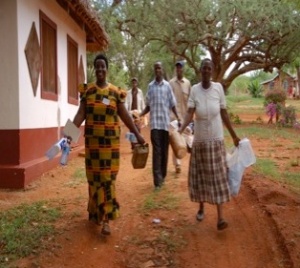 Kitale waste group
Kitale waste group
On 9th May 2014, I was a participant in a one day seminar at University of Eldoret.The meeting was meant to discuss modalities to establish the Regional Centre of Expertise for Education for Sustainable Development for Upper Rift Valley Region. The meeting participants were drawn from diverse institutions including government ministries, county governments in the region, private sector and the civil society.
During the meeting, participants were expected to make presentations on what they are doing to promote sustainable development within the region. Several institutions made their presentations on diverse issues.
I was particularly impressed by a presentation from a Community Based Organization from Kitale which has specialized with value addition for solid waste. They have managed to create many jobs for the youth in the region and this isan initiative that can be replicated throughout the country to combat youth unemployment and poverty.
Dajopen Waste Management Group was formed by a group of 20 people in 2007. They make products using solid waste emanating from households, hotels, and slaughterhouses within Kitale Municipality.
The group collects solid waste dumped on the roadside using wheel burrows and take it to a processing site.

Sometimes the municipality tracks may dump the waste at their site since there is noother established mechanism to deal with solid waste.
 They isolate the organic waste and make it into compost manure. Hence at their site there is a huge mound of compostmanure which is normally invaded by healthy plants such as pumpkins.
They isolate the organic waste and make it into compost manure. Hence at their site there is a huge mound of compostmanure which is normally invaded by healthy plants such as pumpkins.

The members package the organic waste in different size of bags and market it as organic fertilizer.
The members also develop liquid organic fertilizer which they sell to the local community.
The organic fertilizer has contributed to increase in crop yields such as bananas, maize, vegetables, congyet among others. This has contributed to food security and increased incomes for the people.
The group also collects and adds value to plastic and polythene waste. Each member collects polythene waste when they come across it and even buy from other collectors.
The collected polythene bags and plastics are boiled in special chambers called the hopper. Note that the hopper is made from locally available materials. Can you identify these materials in your locality?
The liquid polythene paste is used to make plastic poles and roofing tiles.
Article Categories:
Millionaire Mindset